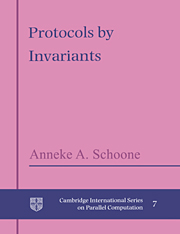
-
Select format
-
- Publisher:
- Cambridge University Press
- Publication date:
- 22 March 2010
- 13 June 1996
- ISBN:
- 9780511663123
- 9780521607551
- Dimensions:
- Weight & Pages:
- Dimensions:
- (247 x 174 mm)
- Weight & Pages:
- 0.39kg, 208 Pages
You may already have access via personal or institutional login
Book description
When several computers have to cooperate to achieve a certain task (i.e. distributed computing) we need 'recipes' (i.e. protocols) to tell them what to do. Unfortunately, human minds are not well suited to keeping track of what might happen given even a very simple protocol. In this book Dr Schoone shows how we can derive properties of those protocols that always hold (i.e. invariants), irrespective of what actually happens in an execution of the protocol. From these invariants the basic attributes of the protocols can be obtained. Each protocol is explained intuitively, proved correct using invariants, and analysed to establish the relation between parameter settings and its essential features. The protocols belong to a wide range of layers in the ISO reference model hierarchy, and include the following: a class of communication protocols that tolerate and correct message loss, duplication, and resequencing; protocols for determining and maintaining routing information, both in a static and a dynamic environment; connection-management protocols; and atomic commitment protocols for use in distributed database management.
Contents
Metrics
Full text views
Full text views help Loading metrics...
Loading metrics...
* Views captured on Cambridge Core between #date#. This data will be updated every 24 hours.
Usage data cannot currently be displayed.
Accessibility standard: Unknown
Why this information is here
This section outlines the accessibility features of this content - including support for screen readers, full keyboard navigation and high-contrast display options. This may not be relevant for you.
Accessibility Information
Accessibility compliance for the PDF of this book is currently unknown and may be updated in the future.

